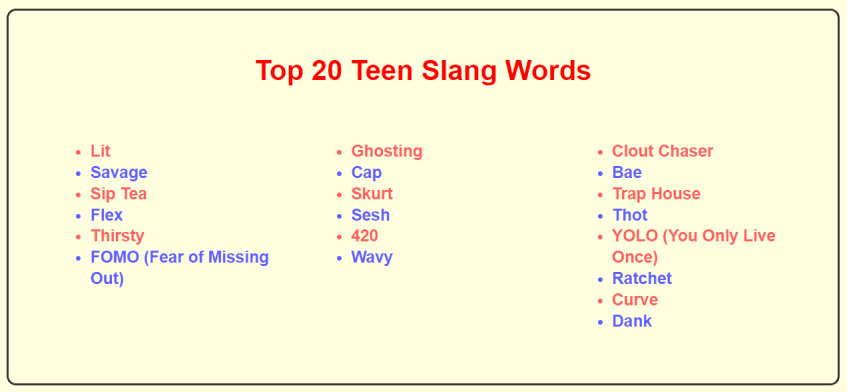Heard Meaning
Heard is the past tense of to hear.
Heard conveys the message that one has understood the literal and implied meanings of what has been said.
How Is Heard Used? Use Cases & Examples
This slang term originates from restaurant terminology. When the chef issues an order, the staff in charge replies with “Heard” indicating that the order has been understood and will be carried out.
Examples of how your teen might use the slang term Heard:
- Last night i had the deepest spiritual revelation. now I finally understand what it means to exist.
Heard! - Megan Fox is smoking hot.
Heard that! - Somebody need to take care of Marcus and his big mouth.
Heard i got it. - Everyone on the team needs to go all out. This is our last chance to make it to the tournament.
Heard.
How to Identify If Your Kids Are Using the Heard Slang Word
“Heard” is a harmless slang term used by teenagers to communicate online. However, there are some slang terms that may indicate that your teens are engaging in risky activities. It’s important to pay attention to teenage slang to protect them. Here are two ways to detect the Heard slang term:
1. Check Their Phones Directly for the Heard Slang Word
Talk to your children and agree on the rules for checking their cell phones. That way you can check your kids’ SMS, search history, and chat messages to see if they’ve used the Heard slang word.
Cons:
- Affect your relationship with your kids
- Troublesome
- Can’t detect dangers timely
Pros:
- No need to install any app
2. Install A Parental Control App to Monitor the Heard Slang Word
A useful parental control app will help you detect risky teen slang like Heard. Once installed on your kids’ phones, you can monitor everything online. In addition to text monitoring, you can also view their search history and chat messages for the slang word Heard. Not only that, but it also provides an alert word feature, allowing you to get alerts in a timely manner. So you won’t have to worry about the safety of your teens.
Pros:
- More features like chat monitoring, GPS tracking, call recording, surrounding recording, etc
- Instant alerts
- Easy to install and use
Cons:
- Some apps are not free
Parental Control Apps to Detect the Heard Slang Word
Android:
- Google Family link:
It is a family parental control service from Google that helps you check search history for the Heard slang word, restrict content, set screen time, and more. - iKeyMonitor:
iKeyMonitor is one of the most powerful parental control apps. It monitors SMS, chat messages, and searched terms on kids’ phones. It will take screenshots/photos and send instant alerts to you on triggered alert words such as Heard. Besides, it will record calls, surroundings and block inappropriate apps to protect your kids from threats.
iOS:
- Apple Screen Time:
With Apple’s built-in parental control setting, you can manage app limits, set content restrictions, and more. Just unlock the iPhone or iPad, then go to Settings and tap on Screen Time. - Norton Family Parental Control:
Norton Family provides insights that help you foster a healthy online/offline balance for your children and their devices. - Kaspersky Safe Kids with GPS:
Kaspersky Safe Kids is a popular parental control app that provides web monitoring, app blocking, filtering, and more. - Alertbird Parental Control:
Alertbird is a parental control app for iOS that monitors the Heard slang term and other dangerous words. You will be notified immediately if it detects alert keywords in your searched terms and chat messages, such as the Heard slang word.
Tips to Talk With Your Kids About the Use of the Heard Slang Word
Everyone wants to be heard and respected, especially teenagers. One of the most important ways parents can help as they stumble through this stage where they are neither children nor adults is to listen and let their teens be heard. Parents don’t have to agree with every word their kids say, but by listening respectfully, they are more likely to discover what their kids are thinking. Here are some tips for behaviors that encourage your teens to talk to you:
- Be a good listener. You should avoid interrupting your kids or entering a conversation with judgment.
- Control your reactions. If you are angry or look uncomfortable, your kids will stop trusting you.
- Don’t try to solve their problems. Avoid the temptation to jump in and fix the problem.
- Keep a unified point of view. It’s not the end of the world if your kids don’t do well or get sent off for misbehavior. Stay calm and support your kids, letting them figure out ways to improve.
